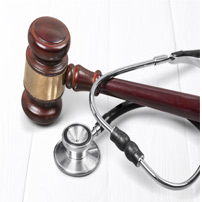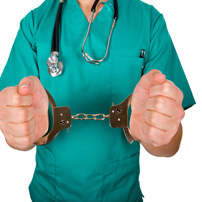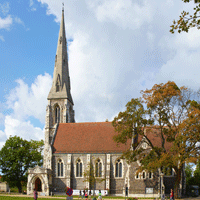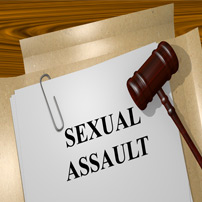Challenges of Doctor-Patient Sex Assault Cases
 When you see a physician for a medical appointment, you expect to receive the highest standard of care, and you also expect that you will be treated ethically. After all, entrusting your health to another human being involves an enormous level of trust. But when that trust is broken, it can be devastating and terribly damaging. Even a consensual sexual encounter in a doctor’s office can be considered a breach of trust.
When you see a physician for a medical appointment, you expect to receive the highest standard of care, and you also expect that you will be treated ethically. After all, entrusting your health to another human being involves an enormous level of trust. But when that trust is broken, it can be devastating and terribly damaging. Even a consensual sexual encounter in a doctor’s office can be considered a breach of trust.
By now most people have heard about the case of Dr. Larry Nassar, who was recently sentenced to 60 years for a conviction of child pornography; and 40 to 175 years for sexual abuse charges. So far, 265 victims have come forward. Nassar operated under a cloak of secrecy for years. He used his privileged position to intimidate young girls, who were either too afraid to speak up, or did not trust their own judgment when they sensed the doctor’s actions were not appropriate.
While the above case made front-page news because it involved Olympic-caliber athletes, this kind of abuse could happen to anyone. In recent years, a doctor at a renowned Cleveland hospital was accused of raping a patient while she underwent a procedure. The hospital kept the doctor on staff while they reached a confidential settlement. The following year, the doctor attacked another woman, changing her life forever. Tragically, that second assault never would have happened if the first incident had been handled properly.
Doctor-Patient Sexual Assault Claims are Unique
Jacobs & Crumplar recently contributed to an article published by the subscription-based online legal news service, Law360. The article addresses some of what makes doctor-patient sex abuses cases unique – and in many ways – challenging.
Sometimes doctors or hospitals reach confidential settlements out of court, as in the case mentioned above. But settlements of this nature can be problematic when it comes to health care. A confidentiality clause can compromise a patient’s health and safety; and they may be unethical because of the vulnerability of future patients.
When a sexual assault by a medical caregiver occurs, there are certain steps that must be taken for victims seeking justice. They include:
- Meet the Statute of Limitations – There is a limited time frame in which to file a claim against a doctor who is accused of sexual assault. This varies by state. Many victims do not want to face the terrible experience they have been through and thus put off talking about it. But immediate action is essential to holding that person accountable.
- Gather Evidence – This may be done initially with a rape kit, and/or through a physical examination immediately following an assault. This is also a time to give an account of what happened while the facts are still fresh in the victim’s mind.
- File the Appropriate Claim – A sexual assault by a physician could fall under the category of personal injury, but it might also fall under medical malpractice. The best route would be determined by a competent attorney, based on the state where the assault occurred.
While these steps are important, it is most important for a victim to seek treatment right away. There may be physical healing and treatment necessary, and there will most certainly be emotional healing that needs to be done.
Delaware Sexual Abuse Lawyers at Jacobs & Crumplar, P.A. Provide Powerful Advocacy for Abuse Victims
If you have been the victim of a sexual assault, we understand the fears and emotions you are dealing with, and we can offer personal, compassionate assistance for your case. If you are seeking an advocate who will stand up for your rights, please call a Delaware sexual abuse lawyer at Jacobs & Crumplar, P.A. today at 302-656-5445 to schedule a confidential consultation or contact us online. From our offices in Wilmington and Georgetown, Delaware, we represent clients throughout the state, including those in Dover, Delaware.
Former USA Gymnastics Doctor Sentenced to 175 Years for Sexual Assaults
 The former USA Gymnastics doctor who sexually assaulted over 160 victims, including several Olympic gymnasts, was sentenced for his criminal acts. Larry Nassar received up to 175 years in prison after pleading guilty in December 2017 to sexually assaulting at least 10 women in the Lansing, Michigan area between 1998 and 2015 while employed at Michigan State University. Even though the case covered about 10 women and their allegations, a disturbing number of sexual abuse victims testified against him with their own accounts of visiting the doctor for a variety of injuries, and enduring the abuse. Well-known gymnasts including McKayla Maroney, Aly Raisman, Gabby Douglas, and Simone Biles revealed their own stories of abuse by USA Gymnastics doctor Larry Nassar during the trial.
The former USA Gymnastics doctor who sexually assaulted over 160 victims, including several Olympic gymnasts, was sentenced for his criminal acts. Larry Nassar received up to 175 years in prison after pleading guilty in December 2017 to sexually assaulting at least 10 women in the Lansing, Michigan area between 1998 and 2015 while employed at Michigan State University. Even though the case covered about 10 women and their allegations, a disturbing number of sexual abuse victims testified against him with their own accounts of visiting the doctor for a variety of injuries, and enduring the abuse. Well-known gymnasts including McKayla Maroney, Aly Raisman, Gabby Douglas, and Simone Biles revealed their own stories of abuse by USA Gymnastics doctor Larry Nassar during the trial.
Generally, doctors are trusted members of the community, and parents and children rarely suspect that a doctor could cause such pain and suffering to their patients by abusing them. The alarming abuse and psychological trauma that victims endure does not end with the physical acts – it may follow the victims throughout their lives, hampering their self-confidence, and inflicting lifelong harm to their self-esteem. They may engage in self-injury, alcohol and drug abuse, and even contemplate suicide.
If you or someone you love has been sexually abused or sexually assaulted, please call our Wilmington sexual abuse lawyers at Jacobs & Crumplar at 302-656-5445 or contact us online to schedule a free, confidential consultation. We represent victims of sexual assault and abuse throughout Delaware, including those in Dover and Georgetown.
Filing a Civil Lawsuit for Child Sexual Abuse
 Victims of child sexual abuse may pursue both criminal charges and civil lawsuits. Whereas criminal cases are brought by the government and may involve jail time as a punishment, civil cases are brought by individuals seeking restitution for a wrongdoing. A civil lawsuit may be filed after a criminal trial is completed regardless of the outcome. Because of the lower standard of proof required, a defendant who was found not guilty in a criminal trial may still be held liable in a civil trial. Civil lawsuits for child sexual abuse can only be brought by certain individuals and typically include multiple causes of action. Victims may be entitled to financial compensation for physical, emotional and psychological harm.
Victims of child sexual abuse may pursue both criminal charges and civil lawsuits. Whereas criminal cases are brought by the government and may involve jail time as a punishment, civil cases are brought by individuals seeking restitution for a wrongdoing. A civil lawsuit may be filed after a criminal trial is completed regardless of the outcome. Because of the lower standard of proof required, a defendant who was found not guilty in a criminal trial may still be held liable in a civil trial. Civil lawsuits for child sexual abuse can only be brought by certain individuals and typically include multiple causes of action. Victims may be entitled to financial compensation for physical, emotional and psychological harm.
Legal Standing
A civil lawsuit for child sexual abuse may be brought on the child’s behalf by the child’s legal guardians or by victims of the abuse themselves. It is common for adult survivors of child sexual abuse to commence a lawsuit after many years of staying silent and suffering with the effects of the abuse. When they finally expose the abusers and hold them accountable, survivors often feel a sense of empowerment and closure.
Because many children do not realize the extent of their injuries until adulthood, many states have extended the statute of limitations for child sexual abuse lawsuits. In Delaware, the Child Victim’s Act allows a child sexual abuse cause of action to be filed at any time following the sexual acts constituting abuse.
Causes of Action
A child sexual abuse civil lawsuit may be based on relevant causes of action depending on the facts of the case. For example, causes of action may include assault and battery. While intentional torts such as assault and battery typically require the plaintiff’s non-consent, in the case of child sexual abuse, a defendant may still be held liable even if the child gave consent because the law views children as incapable of giving valid consent to sexual acts.
Other common causes of action are intentional or negligent infliction of emotional distress and, for cases in which a child was threatened or confined, false imprisonment. Many cases involve third parties such as daycares, schools or churches that may be held accountable for their failure to prevent or stop the sexual abuse. If an individual is employed without proper screening or monitoring and that employee sexually abuses a child, then the employer may be liable for negligent hiring, retention or supervision.
Monetary Damages
Federal statute 18 U.S.C. §2255 authorizes victims of child sexual abuse to file civil lawsuits for the violation of any statutes prohibiting child abuse and exploitation. The statute also states that anyone who suffers personal injury due to such violations will recover no less than $150,000 in damages. Victims may be compensated for any past and future bills and expenses resulting from the crime, such as medical bills and counseling fees. They may also be awarded damages for emotional pain and suffering, loss of enjoyment of life and other non-economic damages.
Wilmington Sexual Abuse Lawyers at Jacobs & Crumplar, P.A. Represent Victims of Child Sexual Abuse in Civil Cases
If your child was the victim of sexual abuse or you are ready to pursue a civil claim for sexual abuse you suffered as a child, contact a Wilmington sex abuse lawyer at Jacobs & Crumplar, P.A. Our lawyers have been successfully litigating child sexual abuse cases for over a decade. We represent clients throughout Delaware from our Wilmington and Georgetown offices. Call us at 302-656-5445, toll-free at 800-355-1818 or contact us online for a free, confidential consultation.
Church Abuse is Still a Problem
 The National Religion Correspondent for The New York Times, Laurie Goodstein, has been writing about child sexual abuse for 22 years. She has covered stories over many faiths, such as Protestant, Jewish, Hindu, Jehovah’s Witnesses, and cult groups, but she finds the abuse within the Catholic church to be far more extensive and offers insight garnered from experts as to why the problem continues.
The National Religion Correspondent for The New York Times, Laurie Goodstein, has been writing about child sexual abuse for 22 years. She has covered stories over many faiths, such as Protestant, Jewish, Hindu, Jehovah’s Witnesses, and cult groups, but she finds the abuse within the Catholic church to be far more extensive and offers insight garnered from experts as to why the problem continues.
In 2016, Goodstein covered the scandal in the Diocese of Altoona-Johnstown. A Pennsylvania grand jury found that the church there covered up child sexual abuse crimes committed by as many as 50 priests and church officials. Over four decades, bishops, police officers, and district attorneys colluded to cover up the abuse of hundreds of children taking place in the diocese in order to avoid bringing scandal upon the church. As is so often the case in the Catholic church, meticulous files were kept that revealed that a judge even found a job for one priest who had been accused of molestation by several families. Had the priest not boasted about it, he would still have the job, but instead the district attorney rescinded the offer with an apologetic note.
The sheer number of Catholics may be a factor in the number of abuse cases that continue to turn up despite recent revelations and landmark cases, such as the Boston scandal featured in the Hollywood movie, Spotlight. The Catholic church is the largest single religious denomination in America today. Roughly a quarter of the U.S. population are Catholics. The hierarchical nature of the church combined with the tradition of extensive record keeping means that patterns of abuse can be tracked through a paper trail. Additionally, in the eyes of parishioners, priests are representatives of Christ, acting “in persona Christi,” or in the person of Christ. For many Catholics, the idea that a priest could commit crimes against children is simply unthinkable.
Thus, Catholic politicians and citizens expressed shock and betrayal when the grand jury reported that two former bishops participated in the cover up in Altoona-Johnstown. In 2002, the United States Conference of Catholic Bishops instituted reforms that called for alerting civil authorities to any allegations of sexual abuse of a minor by members of the clergy, establishing prevention programs in parishes and schools that would teach adults and children about warning signs of abuse, and using background checks when hiring employees. Priests known to have committed abuse were also barred from ever serving as pastors or chaplains in parishes, schools, nursing homes, or hospitals. The reforms drew the line however at defrocking the abusers. While devout parishioners and those who had suffered abuse as children saw the reforms as a first step to confronting the problem and changing the church, the grand jury report showed that in Altoona-Johnstown, nothing much had changed raising the question of when and if it ever will.
Wilmington Sexual Abuse Lawyers at Jacobs & Crumplar, P.A. Obtain Justice for Victims of Child Sexual Abuse
At Jacobs & Crumplar, P.A. we have been helping victims of sexual abuse fight back since 2004. We have successfully brought litigation against the Catholic church and other churches, private and public schools, and doctors. We know that many victims are only able to come forward many years later. A consultation with a Wilmington sexual abuse lawyer from our firm is free and confidential. Call us today at 302-656-5445 or contact us online. We represent victims in Wilmington, Dover, and Georgetown, Delaware, as well as those throughout the state.
Jacobs & Crumplar to Represent Victim Assaulted at Haunted Attraction
 Jacobs & Crumplar, P.A., has filed a civil lawsuit on behalf of the mother of a 13-year-old girl who was raped while volunteering at Cemetery House Haunted House in Laurel, Delaware. The nineteen-year-old assailant was also a volunteer at the site. The lawsuit names the perpetrator, along with the company that owns the haunted house. The lawsuit alleges negligence by the company.
Jacobs & Crumplar, P.A., has filed a civil lawsuit on behalf of the mother of a 13-year-old girl who was raped while volunteering at Cemetery House Haunted House in Laurel, Delaware. The nineteen-year-old assailant was also a volunteer at the site. The lawsuit names the perpetrator, along with the company that owns the haunted house. The lawsuit alleges negligence by the company.
The incident happened in October 2016 inside the haunted attraction, which is described as the longest continuously running haunted house on the Eastern Shore. Cemetery House reopened for the 2017 Halloween season this past Friday, October 13. The attraction claims to “frighten thousands of victims each year,” and is open annually during the last three weekends in October.
According to the Delaware Office of the Attorney General, the perpetrator pled guilty to the charges of fourth degree rape, and unlawful sexual conduct second degree. He was sentenced to fifteen years in prison and will be required to register as a Tier II sex offender.
Legal Recourse for Victims of Sexual Assault
The victims of sexual abuse suffer long after the initial attack. As such, the law allows victims to file lawsuits in civil court against their perpetrators. This is separate from criminal prosecution. The damages for a sexual assault or sexual abuse in a civil trial will be based on the physical and emotional harm the victim suffered, and will continue to suffer, as a result of the crime. Because these crimes are so heinous, a jury will often award victims very high damages to be paid by the perpetrator and any other responsible party.
Sometimes other responsible parties can be held liable along with the actual perpetrator of the crime. For example, if the assault occurred at a business, a school, or an institution, that entity may be included in the lawsuit. With regard to that entity, the lawsuit would typically be based on a negligent supervision claim, or failure to provide proper security.
A civil case is generally much easier to win than a criminal prosecution because the standard of proof is lower. The victim only needs to show that there is a “preponderance of the evidence.” So, even if there was no criminal prosecution, and even if the defendant was not convicted, the victim can still prevail.
Delaware Sexual Abuse Lawyers at Jacobs & Crumplar, P.A. Provide Compassionate, Intelligent Guidance for Victims of Sexual Assault
If you have been the victim of a sexual assault, we understand the fears and emotions you are dealing with, and we can offer personal, compassionate assistance for your case. To arrange a free consultation with an experienced Delaware sexual abuse lawyer, call Jacobs & Crumplar, P.A. today at 302-656-5445 or contact us online. From our offices in Wilmington and Georgetown, we represent individuals and families throughout the state, including those in Dover, Delaware.
Changes to Title IX Guidance
 Victims’ rights groups and others have denounced changes made to the handling of sexual conduct claims on college and university campuses under Title IX, a federal law that prohibits discrimination in education. However, Education Secretary Betsy DeVos believes that the interim rule will strike a more appropriate balance between those accused of sexual misdeeds and their accusers. The decision came less than two weeks after DeVos said that she would begin a new rule-making procedure to determine how to best guide colleges and universities in handling sexual misconduct claims.
Victims’ rights groups and others have denounced changes made to the handling of sexual conduct claims on college and university campuses under Title IX, a federal law that prohibits discrimination in education. However, Education Secretary Betsy DeVos believes that the interim rule will strike a more appropriate balance between those accused of sexual misdeeds and their accusers. The decision came less than two weeks after DeVos said that she would begin a new rule-making procedure to determine how to best guide colleges and universities in handling sexual misconduct claims.
The interim rule replaces guidance issued in 2011 by then-President Barack Obama’s administration, which reminded educators of their responsibility to investigate and respond to allegations of sexual misconduct under Title IX. Although certain victims’ rights groups believed the guidance helped victims to come forward, critics believe it created a system in which the accused were often punished without legal due process.
As the guidance was rescinded, the Department of Education issued an email that criticized the earlier document and a question-and-answer sheet that was circulated in 2014, which explained how to implement it. The email stated that the documents “ignored notice and comment requirements, created a system that lacked basic elements of due process, and failed to ensure fundamental fairness.”
A new Question-and-Answer sheet includes the following information:
- It allows colleges and universities to decide whether to continue using the lesser “preponderance of evidence” standard when deciding claims
- It permits colleges and universities to move to a tougher “’clear and convincing evidence” standard if they deem it appropriate
- It clarifies that schools must still “take steps to understand what occurred and to respond appropriately,” but that they must do so “in a manner that respects the legal rights of students and faculty, including those court precedents interpreting the concept of free speech”
- It states that institutions may restrict contact between the parties, impose leaves of absence, change housing or class schedules, or take other appropriate measures, but they must not rely on “fixed rules”
- It explains that interim measures must be “individualized and appropriate based on the information gathered by the (school’s) Title IX coordinator”
The new policy, which may be replaced if the Education Department settles on a final rule in the months ahead, places the burden on the school to gather sufficient evidence to reach a fair and impartial determination. It also requires that both the accuser and the accused are afforded written notice and other legal rights. Ms. DeVos stated that “Schools must continue to confront these horrific crimes head on. There will be no more sweeping them under the rug. But the process must also be fair and impartial.”
Delaware Sexual Abuse Lawyers at Jacobs & Crumplar, P.A. Pursue Title IX Claims for Victims of Sexual Misconduct
If you have been the victim of sexual abuse, you need a tough advocate. Contact the law offices of Jacobs & Crumplar, P.A. at 302-656-5445 to schedule a confidential consultation with a dedicated and highly skilled Wilmington sexual abuse lawyer, or you can contact us online. We will provide the compassionate guidance you need to secure the justice you deserve. From our offices in Wilmington and Georgetown, we represent clients throughout Delaware.
Protecting Our Children: Delaware And Other States Take Action On Behalf of Human Trafficking Victims
In 2014, the Delaware legislature signed into law S. B 197, a bill to fight human trafficking.
Human trafficking is the trade of humans, most commonly for the purpose of sexual slavery, forced labor or commercial sexual exploitation for the trafficker or others. Forced labor and trafficking is a billion dollar industry.
The International Labor Organization estimates 20.9 million victims o trafficking globally.
Human trafficking includes bonded labor, forced labor and includes the trafficking of children. S.B. 197 uses provisions of the Uniform Law Commission’s Uniform Act on Prevention of and Remedies for Human Trafficking Act.
Other states have also stepped up their efforts to address issues related to human trafficking:
In March 2014, the State of Maryland established a Maryland Human Trafficking Policy Advisor position to develop and implement policies, training, and data collection procedures that build Maryland’s capacity to combat trafficking and serve survivors.
The Maryland legislature also passed three bills on behalf of victims including protections from prosecution for youths forced into prostitution and free community college for victims.
Pennsylvania’s Act 105, which became law in September 2014, added new definitions of sex trafficking to the Criminal Code and established expanded legal protections for victims of trafficking.
Act 105 also establishes a civil cause of action so that victims may seek compensatory and punitive damages along with other appropriate relief against their traffickers.
The Human Trafficking Prevention, Protection and Treatment Act in New Jersey makes it possible for victims to have unjust convictions removed from their records. The Act also provides witness protection for victims and makes it easier for law enforcement to prosecute the traffickers.
These protections, on behalf of our most vulnerable children, as well as others passed at the state and federal level, are helping to restore the rights and freedoms that have been stolen from them.
Call the Delaware lawyers at Jacobs & Crumplar, P.A. at 302-656-5445 or contact us online to schedule a free consultation. We represent clients throughout Delaware from our offices in Wilmington and Georgetown.
The Double Standard of Rape and Molly Shattuck
The recent press coverage of a rape of a 15 year old boy by an attractive 47 year ex Baltimore Raven Cheerleader sadly should remind all of us the rape is truly gender neutral and the all too present double standard the excuse the rape of boys by women.
In many states (including Delaware) it was not until the 1970s that the crime of rape was even defined to include a woman sexually abusing a young boy.
Medical studies have shown the boys just as girls will suffer for the rest of their lives as result of this sexual abuse. Boys in some ways may have it even harder but society far too often has a double standard.
If the story in the paper had a been about a 47 year old man who had been Baltimore Raven’s football player and who had sex with a 15 year girl everyone would be outraged and want to send him to straight to prison.
In the case involving sexual abuse between Molly Shattuck and the young male victim, I am sure many of the victims friends and classmates are congratulating him for “scoring “ with a “hot woman”, not realizing the power imbalance and the lifetime of scars the sex will cause.
I can only hope this young victim will get the best possible help. I have had the honor and privilege of representing a number of boys who were abused by powerful women and I can tell you it is very difficult for them to come forward.
I would encourage him and others in a similar situation to not simply rely on the prosecuting attorney. The State prosecutor represents the State not the victim.
There are things a good civil lawyer can do even during the criminal proceeding to protect the victim, including asking the Court to make as part of any sentencing the requirement that the victim’s medical and counseling expense be paid by the abuser and that this be part of any sentence.
One final note from the sports world -one of my heroes growing up was Mickey Mantle, the Hall of Fame New York Yankee baseball player. His career and his life was cut short due to decades of hard partying. I recently found out why – he was abused as a boy by several older women, and this caused a lasting perverse effect on him.
Children are the Victims, Not the Pedophiles Who Abused Them
Margo Kaplan’s article recent NY Times article is an interesting, but somewhat disturbing, read. She makes the point that being a pedophile is different than acting upon it.
The author claims “Without legal protection, a pedophile cannot risk seeking treatment or disclosing his status to anyone for support. He could lose his job, and future job prospects, if he is seen at a group-therapy session, asks for a reasonable accommodation to take medication or see a psychiatrist, or requests a limit in his interaction with children.”
This is wrong and disturbing on a number of levels. First, consultation with a doctor/psychologist/psychiatrist and/or lawyer is confidential and the pedophile’s identity cannot be disclosed. So the pedophile does have legal protection to allow him to seek treatment and disclose his status.
Second, he can take medication or see a psychiatrist on his own time. Third, his job duties should never include “interaction with children” at all.
The article blames society, in part, for pedophiles acting out. If a pedophile chooses to act out, he has no one to blame but himself. Childhood sexual abuse is a scourge on our country – the headlines continue day after day despite increased criminal and civil penalties.
We should always err on the side of protecting vulnerable, innocent children from pedophiles.
Vatican /Delucca and the Defrocking of Priests for Child Sex Abuse
The Vatican with great fanfare has bragged about all the priests they have defrocked for the abuse of the children of the Church. Much more has to be done by the Church before the problem of Priest preying on the children is solved. The Church must adopt a stringent policy of zero tolerance.
Defrocking is a powerful deterrent to most priests as it threatens their entire identity. Because it is so important to the priest there is a detailed process the Church has to go through if the Priest contests it. But like anything else if the Church really wants someone defrocked it can move quickly
A case in point in the case involving the infamous Francis Delucca a Delaware priest who had abused over 30p boys. After he was caught abusing his great nephew and sent to prison the Church finally started defrocking proceedings. These were moving very slowly until trial against the Wilmington Diocese for its grossly negligent handling of Delucca was set to begin and PRESTO out of nowhere there is a big press announcement timed on the eve of trial that the Vatican had now defrocked Delucca and that he was no longer a priest etc.

